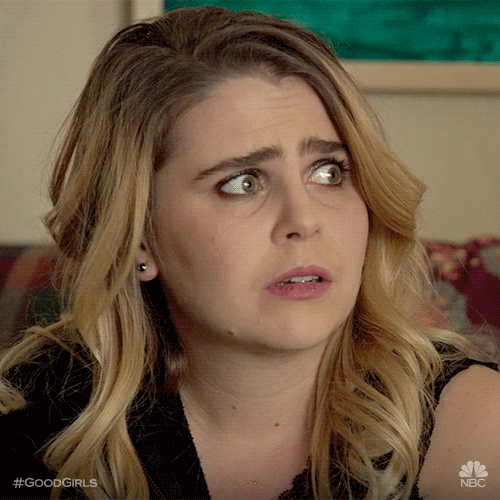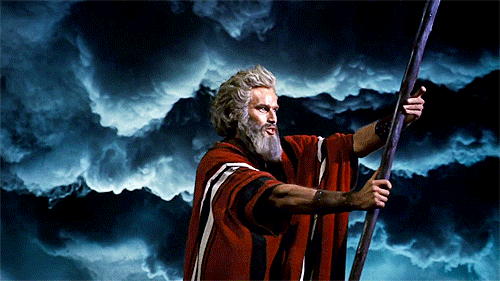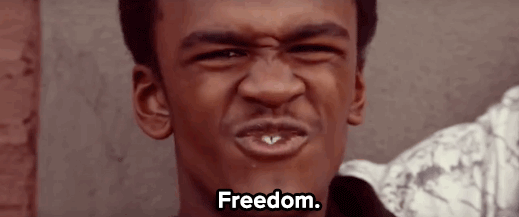 Welcome to the latest edition of Books on GIF, the animated alternative to boring book reviews. This Sunday's book is 'Moses, Man of the Mountain' by Zora Neale Hurston.
Welcome to the latest edition of Books on GIF, the animated alternative to boring book reviews. This Sunday's book is 'Moses, Man of the Mountain' by Zora Neale Hurston.
 Earlier this week, I was sitting at the bar in a budget hotel in Midtown finishing this book. An older woman approached and asked what I was reading. I showed her the book, and she reached out and touched the image of Moses on the cover. "What's it about?" she asked. I told her it was a retelling of Exodus. She ran her fingers over Zora Neale Hurston's name and told me she had heard of the author. "But this shows Moses as black. Are there some people who think Moses is black?" she asked. Yes, I said, reminding her that Moses was from Africa. "Well that settles it then," she said with a sarcastic tone. I replied: "I mean, he wasn't white." She turned and left. I was like:
Earlier this week, I was sitting at the bar in a budget hotel in Midtown finishing this book. An older woman approached and asked what I was reading. I showed her the book, and she reached out and touched the image of Moses on the cover. "What's it about?" she asked. I told her it was a retelling of Exodus. She ran her fingers over Zora Neale Hurston's name and told me she had heard of the author. "But this shows Moses as black. Are there some people who think Moses is black?" she asked. Yes, I said, reminding her that Moses was from Africa. "Well that settles it then," she said with a sarcastic tone. I replied: "I mean, he wasn't white." She turned and left. I was like:
 I shouldn't have been surprised. For one thing, willful ignorance and bigotry are in ascendance. For another, American movies have for generations swapped in white actors to portray people of color, so most people probably still think Moses looked like a white man with a tan:
I shouldn't have been surprised. For one thing, willful ignorance and bigotry are in ascendance. For another, American movies have for generations swapped in white actors to portray people of color, so most people probably still think Moses looked like a white man with a tan:
 Instead of walking away from me, the woman should have asked to borrow this book because she would have learned a lot. I did. 'Moses, Man of the Mountain' recounts the story of Moses with all the familiar plot points: the basket in the Nile, the burning bush, 'Let my people go,' plagues, parting the Red Sea, the golden calf, 40 years in the wilderness and so on. But Hurston, as she writes in her introduction, wants to paint a picture of Moses that incorporates the folklore of Africa, Haiti, the West Indies and Asia where Moses is revered, and even worshipped, as a man of power who speaks to God and commands Him. The result is a complex, interesting and human character. We see Moses grow and change from a great Egyptian military commander, to a man who can turn rods into snakes, to a great liberator who must endure the burdens of leading a newly free nation. Along the way we see his inner thoughts and doubts: He questions, for example, whether it was worth it to free the Israelites given their frequent desire to return to Egypt and bondage when the going got tough. He also has a sense of humor. He has regrets. He is ruthless. I was like:
Instead of walking away from me, the woman should have asked to borrow this book because she would have learned a lot. I did. 'Moses, Man of the Mountain' recounts the story of Moses with all the familiar plot points: the basket in the Nile, the burning bush, 'Let my people go,' plagues, parting the Red Sea, the golden calf, 40 years in the wilderness and so on. But Hurston, as she writes in her introduction, wants to paint a picture of Moses that incorporates the folklore of Africa, Haiti, the West Indies and Asia where Moses is revered, and even worshipped, as a man of power who speaks to God and commands Him. The result is a complex, interesting and human character. We see Moses grow and change from a great Egyptian military commander, to a man who can turn rods into snakes, to a great liberator who must endure the burdens of leading a newly free nation. Along the way we see his inner thoughts and doubts: He questions, for example, whether it was worth it to free the Israelites given their frequent desire to return to Egypt and bondage when the going got tough. He also has a sense of humor. He has regrets. He is ruthless. I was like:
 Hurston's writing is beautiful, and I loved how she used different voices in her narrative, from the traditionally biblical to what the back flap of the book describes as 'black dialect.' Putting elements of this story in an African American vernacular made it a parable for America, and I was reminded that more than a century since emancipation we as a nation are still in the wilderness, unready to cross into a promised land of true equality and justice. Monuments to Pharaoh's slavery still exist in many cities across our country and within our government that punishes football players for protesting police brutality and targets immigrants and their children. Racism, toxic masculinity, anti-gay bigotry and closed mindedness are all tributes to Pharaoh. But what was perhaps most interesting and provocative about 'Moses, Man of the Mountain' was Hurston's exploration of:
Hurston's writing is beautiful, and I loved how she used different voices in her narrative, from the traditionally biblical to what the back flap of the book describes as 'black dialect.' Putting elements of this story in an African American vernacular made it a parable for America, and I was reminded that more than a century since emancipation we as a nation are still in the wilderness, unready to cross into a promised land of true equality and justice. Monuments to Pharaoh's slavery still exist in many cities across our country and within our government that punishes football players for protesting police brutality and targets immigrants and their children. Racism, toxic masculinity, anti-gay bigotry and closed mindedness are all tributes to Pharaoh. But what was perhaps most interesting and provocative about 'Moses, Man of the Mountain' was Hurston's exploration of:
 She writes that liberation and freedom are not the same thing; that the latter is only achievable through the former plus hard work and time. On page 282, Moses reflects:
She writes that liberation and freedom are not the same thing; that the latter is only achievable through the former plus hard work and time. On page 282, Moses reflects:
He found out that no man may make another free. Freedom was something internal. The outside signs were just signs and symbols of the man inside. All you could do was give the opportunity for freedom and the man himself must make his own emancipation.
I think you see this idea working through the #MeToo movement and Black Lives Matter, among others. Women and men are speaking out against sexual and racial injustice in America, and through that they are trying to make themselves and the rest of us:
 'Moses, Man of the Mountain' is a work of genius and everyone — from you to your racist uncle to your 'woke' friend — should read it.
'Moses, Man of the Mountain' is a work of genius and everyone — from you to your racist uncle to your 'woke' friend — should read it.
My rating:
 'Moses, Man of the Mountain' by Zora Neale Hurston was originally published by J. B. Lippencott, Inc. in 1939. The Harper Perennial Modern Classics edition was published in 2009. 288 pages. $5.95 at Strand Book Store.
'Moses, Man of the Mountain' by Zora Neale Hurston was originally published by J. B. Lippencott, Inc. in 1939. The Harper Perennial Modern Classics edition was published in 2009. 288 pages. $5.95 at Strand Book Store.
** If you enjoyed this newsletter, please share Books on GIF with a friend. **
In case you missed it: Books on GIF #82 featured 'Circe' by Madeline Miller.
What's next: In two weeks you'll get a review of 'Homesick For Another World' by Ottessa Moshfegh. Also in the queue are 'The Lamb Will Slaughter the Lion' by Margaret Killjoy, 'Basic Black With Pearls' by Helen Weinzweig and 'Trick' by Domenico Starnone, among others.
Send your recommendations: If you've got a bestseller, a classic or a forgotten gem you want me to review, shoot me an email anytime.
BoG is everywhere: Hit me up on Twitter, Facebook, Instagram and Goodreads. I also have a new and easier-to-remember web address: www.booksongif.com.
Thanks for reading, and thanks especially to Donna for editing this review!
Until next time,
 MPV
MPV












